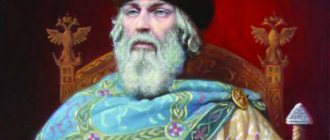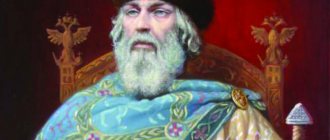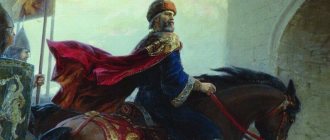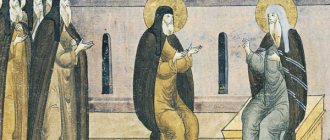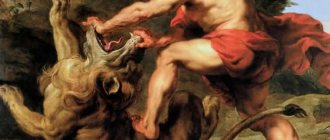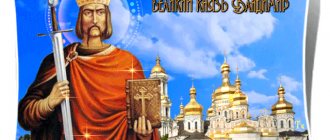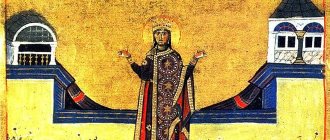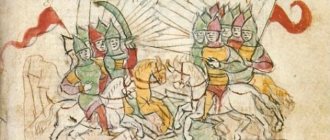About the product
“The Teachings of Vladimir Monomakh” is rightfully considered a literary monument of the 12th century, which left a big mark not only in literature, but also in the history of Russia. The work written by the Grand Duke of Kyiv Vladimir Monomakh is also known as “Instruction for Children.”
We recommend reading online a summary of “The Teachings of Vladimir Monomakh” on our website. A retelling of the story will be useful in preparing for a literature lesson and for a reading diary.
The material was prepared jointly with a teacher of the highest category, Ilyina Galina Sergeevna.
Experience as a teacher of Russian language and literature - 36 years.
Briefly about the history of creation
Researchers believe that Vladimir Monomakh conceived his “Teaching” around 1100 - 1117. But it was written in full later. The prince himself noted that he was drawing up an order for his descendants, “sitting on a sleigh” (that is, slowly preparing to depart for another world). The “Instruction” came to us in the lists of the Laurentian Chronicle.
“Instruction” is an excellent historical source that helps to study Rus' during the early Middle Ages, and at the same time a magnificent literary work, rich in vivid epithets, apt comparisons and wise thoughts.
Summary
In his teaching, Prince Vladimir addresses his descendants, those who will take his words seriously and “will not be lazy, but will work.” He believes that “the beginning of all good” is love for God and a merciful, sympathetic heart. And if someone doesn’t like his “literacy”, then you shouldn’t blame him.
Prince Vladimir describes how the decision to write a message to his descendants was prompted by his meeting with ambassadors from his brothers on the way to the Volga. The brothers invited him to go with them against the Rostislavovichs, but he refused. In search of peace of mind, the prince began to read the Psalter, and it was the reading of sacred scripture that prompted him to leave a message for future generations.
The first thing the prince asks to follow is “to have a pure and immaculate soul, a thin body, a meek conversation and to keep the word of the Lord.” Every young person should honor the wisdom that comes with age: one should remain silent in front of old people, one should submit to elders, listen carefully to wise, educated people. You should communicate with peers and juniors favorably, “without guile” or arrogance. Adolescents need to avoid bad company, where there may be unlucky women or those who like to waste their lives. One must strive to benefit others, lend a helping hand to those in need - this is the only way to hope for divine reward.
According to Prince Vladimir, it is very important to “have pure thoughts” and encourage yourself to do only good, honest deeds. Young people should not forget the commandments of God: not to take revenge on their persecutors, to love even those who do not love you, to uncomplainingly endure all hardships sent down from above, and not to respond with evil to detractors. The prince reminds that all people are sinners and it is impossible to live life without committing a single bad act, but one must strive with all one’s nature to behave with dignity.
In his teaching, Prince Vladimir once again reminds us of the dangers of laziness: “neither seclusion, nor monasticism, nor fasting” is it possible to achieve God’s mercy, but only through labor, even small ones. Next, he admires the great miracles and blessings that the Lord created: darkness, light, heavenly bodies, animals, birds and fish - the amazing diversity with which the world is filled. The prince urges us not to forget to praise the Lord and bow to him both in church and at home - “by bowing at night and praying, a person defeats the devil, and whatever sins he sins during the day, this person gets rid of.”
Prince Vladimir instructs his descendants, who will be tested by power, not to kill or give orders for the execution of the guilty. Even if a person turns out to be guilty, “no Christian soul” should be destroyed. When you say something, “good or bad,” you shouldn’t cross yourself and swear to God—there’s no need for that. You should never forget that “we are mortal, today we are alive, and tomorrow we are in the grave,” and you should only worry about your immortal soul by doing good deeds.
A very brief retelling of “The Teachings of Vladimir Monomakh”
The “teaching” begins with an appeal to “the children... or anyone else” who will read this “letter.” Monomakh is already old, he writes the message “sitting on a sleigh,” that is, slowly preparing to depart to a better world.
Prince Vladimir, having carefully selected lines from the Psalter about moral principles for his younger relatives, quotes them. It is necessary to “hide from the gathering of the evil ones,” that is, liars and envious people, “to submit to the elders,” “to have love for the younger ones,” and not to forget about “repentance, tears and mercy.”
This can be applied to any person. Knowing that his sons will have to reign and decide the destinies of people, Monomakh pays special attention to those people who are in power and gives reasonable advice that will be useful to every ruler.
It is necessary to “kill neither the right nor the wrong,” give to orphans, protect widows from harm, and help the poor. The welfare of the breadwinner people should be taken care of.
You need to live ascetically, not wallow in luxury, but try to maintain health with moderation in everything, get up early - before dawn, not part with weapons (there are many dangers, you should always be ready to defend yourself and your land), remember God, often travel around your lands , personally observing how princely orders were carried out.
Next, Monomakh unfolds before his sons a motley picture of his own life: from the age of 13 he is a warrior, ruler, prince. Vladimir Vsevolodovich talks about the campaigns he undertook against the Polovtsians, Poles, and Torque nomads.
Vladimir made “eighty and three great” campaigns; he “won’t even remember” the rest, the insignificant ones. He tried to make peace with the Russian princes so as not to ruin the land, but he humbled his enemies.
In between military labors, Vladimir took part in the popular male entertainment of those times - hunting. However, this activity can be considered entertainment or a kind of sport now; then it was a truly risky activity, which made it possible to obtain meat for food and skins for dressing.
Many dangers awaited Monomakh while hunting: wild animals repeatedly wounded him, but he survived thanks to his dexterity, ingenuity and luck.
Once again, the prince mentions the need to keep his body strict and do a considerable part of the work himself, which must be done by servants, “youths” - it was this principle that he always adhered to, this allowed him to remain strong and strong.
Monomakh focuses the attention of those reading the “Instruction” on the fact that the ruler must be a reasonable, fair person, and have a kind heart.
The last part of the work is addressed to Monomakh’s cousin Oleg. Monomakh's son Izyaslav died in the civil strife. Having admitted the guilt of his son, who went to war against a close relative (Oleg was his godfather) and refusing to take revenge for him, Monomakh appeals to Oleg’s reason: he needs to make peace, he must not shed the blood of his brothers.
Vladimir offers to send Izyaslav’s widow, who is in Oleg’s captivity, so that he, Izyaslav’s father, can settle the unfortunate woman with him and mourn the loss with her.
Vladimir Monomakh concludes his “Teaching” with prayers in which he asks God for mercy for himself and his loved ones and subjects.
Structure of the work
Vladimir Monomakh is one of the most well-read people of his time. His grandfather, Yaroslav the Wise, is a storehouse of earthly and heavenly wisdom. Father Vladimir Yaroslavich knew five languages and was a man of broad culture. Moreover, all three were canonized by the Russian Orthodox Church.
Prince Vladimir II Vsevolodovich Monomakh
The prince not only possessed a variety of knowledge, he was well-read, and also had literary talent - all this was embodied in his work. It contains several genres (theology, autobiography, writing), and consists of three parts:
- Moral and religious. The teaching itself, which is a theological appeal to children, both relatives and spiritual ones. Prince Vladimir appears here as a father to all Russian people according to the power given to him by God. Princely service is worldly service to God, so he must give instruction.
- Private. The autobiographical part of the work, a list of affairs or a story about how military campaigns took place, how he defended the Russian land from Polovtsian raids.
- Public-state. Letter addressed to Oleg Svyatoslavovich Chernigovsky.
The work was most likely composed in the first week of Lent. There are mournful notes here, a call to repentance, an awareness of the path traveled. Along with the personal, the idea of the unity of Rus' runs through the entire work, which gives it national, historical significance.
Monomakh's hat
By studying everything that the prince wanted to say to his descendants, one can see what a wise and truly great man Vladimir Monomakh was. The “Teaching” (a brief summary is presented in the article) has become the best testament for us and for modern people, who often do not understand all the Gospel values, and this can lead to irreparable consequences.
Monomakh died at the age of 74, in 1125. The Moscow tsars considered it a great honor to be called his descendants. The Armory Chamber of the capital's museum still houses the cap of Vladimir Monomakh and all the royal attributes of this divine anointed (scepter, bars, orb).
Who is Monomakh and what do we know about him?
The blood of the Byzantine and Russian people flowed in the veins of the great Russian ruler. Father - Vsevolod - was one of the sons of Yaroslav the Wise - a famous ancient Russian prince. Mother is the daughter of the Byzantine Emperor Constantine IX, from whom his grandson Vladimir got the nickname Monomakh.
The throne of the king went to Monomakh when he turned sixty. During his reign, he managed to reconcile the warring principalities and put an end to internecine wars.
In the memory of his descendants, the great ruler will forever remain a deeply religious philosopher and thinker.
Old Russian prince Vladimir Monomakh
Monomakh's story about his life
The second part of Monomakh's work is completely autobiographical. In it, he talks about his military campaigns and hunting affairs, about the defense of the Russian land from nomads, as well as about the peculiarities of conducting household chores.
...what my boy had to do, he did it himself - in war and on the hunt, night and day, in heat and cold, without giving himself rest.
...he did not give offense to the poor bastard and the poor widow; he himself observed the church order and the service.
Small episodes from the life of the ruler create in the reader’s imagination the image of an ancient Russian prince: brave and caring - the way a Russian tsar should be.
Describing his daily affairs, Vladimir does it with unprecedented modesty and without boasting. For example, he calls his military campaigns ordinary trips, but does not write about victory in them at all or says briefly: “God helped us.”
In his description of his hunting activities, the prince never mentions how many trophies he managed to get. On the contrary, he talks about how many wounds he inflicted on the animals and how selflessly they defended themselves from the hunters:
...for two rounds they tossed me and my horse with their horns, a deer and two elk beat me.
The retelling of one’s own life, excerpts from the Holy Scriptures, and narratives about the author’s inner worldviews formed the basis of a new genre of ancient Russian literature - autobiography, which did not exist before.
Gospel Instructions
When you arrive somewhere, where you stop, give food to the poor. And honor your guest who comes to you, no matter how rich or poor he is. If it is not possible to honor him with a gift, then at least give him food and water. Such guests tend to spread rumors about a person throughout all lands, whether he is evil or good. If someone close to you is sick, you need to visit him, if someone has died, you should see him off with dignity. When meeting any person, you need to behave affably and spare no kind words. You need to love your wife, but not give her power over yourself. You shouldn’t forget anything useful, and what you don’t know, you need to learn. You need to hurry up and not be lazy to do good things.
You should definitely go to church and pray, as our ancestors and best people did. After morning prayer - praise to God, you need to get down to business.
